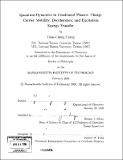Quantum dynamics in condensed phases : charge carrier mobility, decoherence, and excitation energy transfer
Author(s)
Cheng, Yuan-Chung, Ph. D. Massachusetts Institute of Technology
DownloadFull printable version (13.90Mb)
Other Contributors
Massachusetts Institute of Technology. Dept. of Chemistry.
Advisor
Robert J. Silbey.
Terms of use
Metadata
Show full item recordAbstract
In this thesis, we develop analytical models for quantum systems and perform theoretical investigations on several dynamical processes in condensed phases. First, we study charge-carrier mobilities in organic molecular crystals, and develop a microscopic theory that describes both the coherent band-like and incoherent hopping transport observed in organic crystals. We investigate the structures of polaron states using a variational scheme, and calculate both band-like and hopping mobilities at a broad range of parameters. Our mobility calculations in 1-D nearest-neighbor systems predict universal band-like to hopping transitions, in agreement with experiments. Second, motivated by recent developments in quantum computing with solid-state systems, we propose an effective Hamiltonian approach to describe quantum dissipation and decoherence. We then applied this method to study the effect of noise in a number of quantum algorithms and calculate noise threshold for fault-tolerant quantum error corrections (QEC). In addition, we perform a systematic investigation on several variables that can affect the efficiency of the fault-tolerant QEC scheme, aiming to generate a generic picture on how to search for optimal circuit design for real physical implementations. (cont.) Third, we investigate the quantum coherence in the B800 ring of' of the purple bacterium Rps. acidophila and how it affects the dynamics of excitation energy transfer in a single LH2 complex. Our calculations suggest that the coherence in the B800 ring plays a significant role in both spectral and dynamical properties. Finally, we discussed the validity of Markovian master equations, and propose a concatenation scheme for applying Markovian master equations that absorbs the non-Markovian effects at short times in a natural manner. Applications of the concatenation scheme on the spin-boson problem show excellent agreements with the results obtained from the non-Markovian master equation at all parameter range studied.
Description
Thesis (Ph. D.)--Massachusetts Institute of Technology, Dept. of Chemistry, 2006. Vita. Includes bibliographical references.
Date issued
2006Department
Massachusetts Institute of Technology. Department of ChemistryPublisher
Massachusetts Institute of Technology
Keywords
Chemistry.